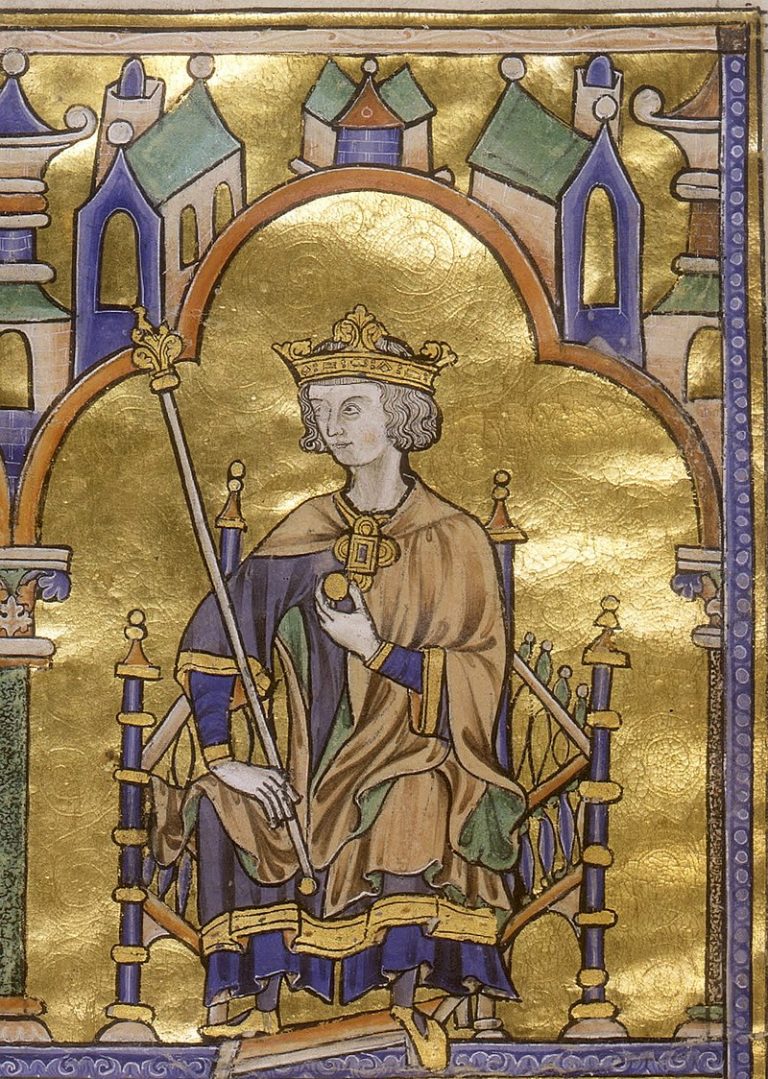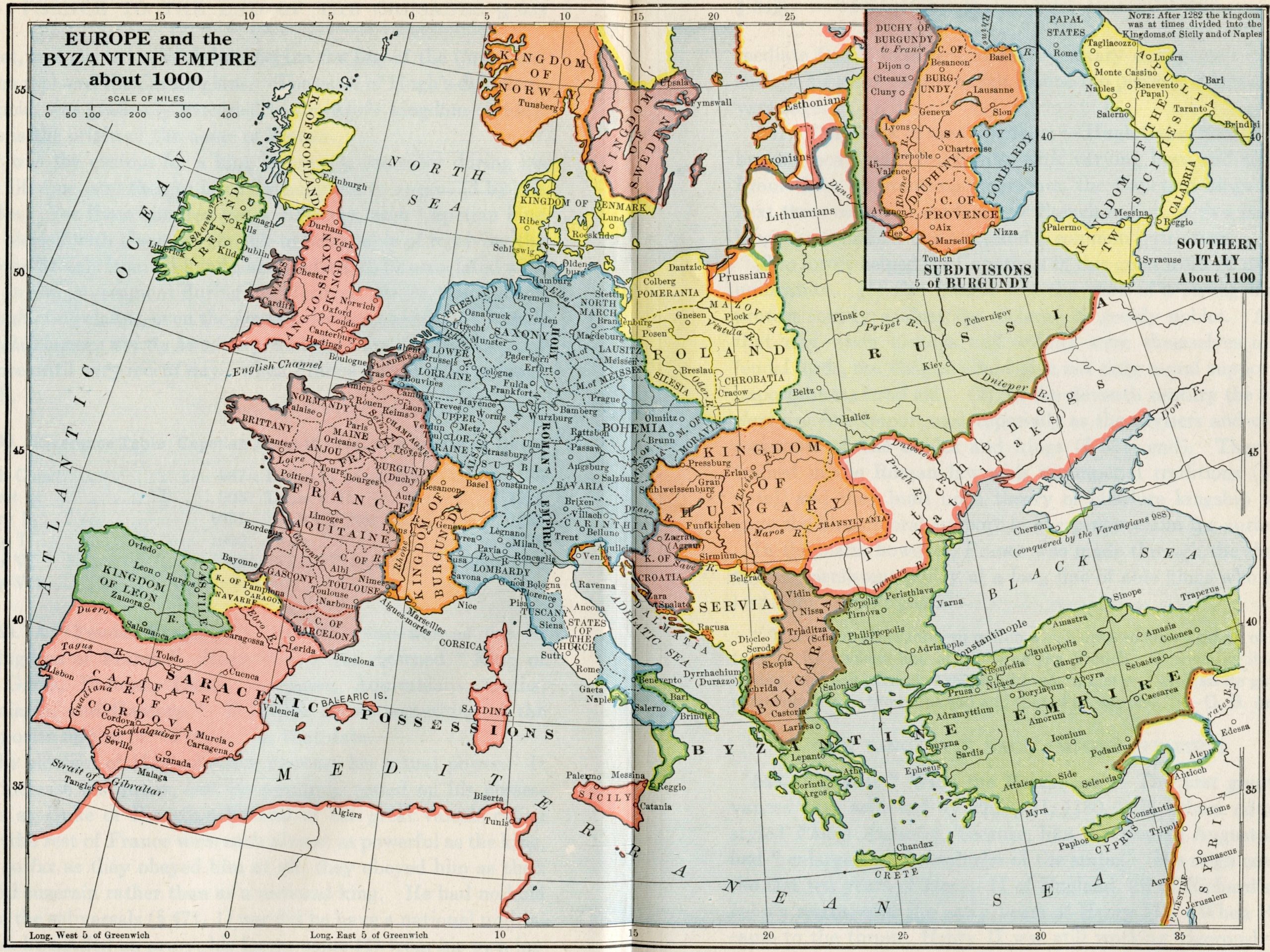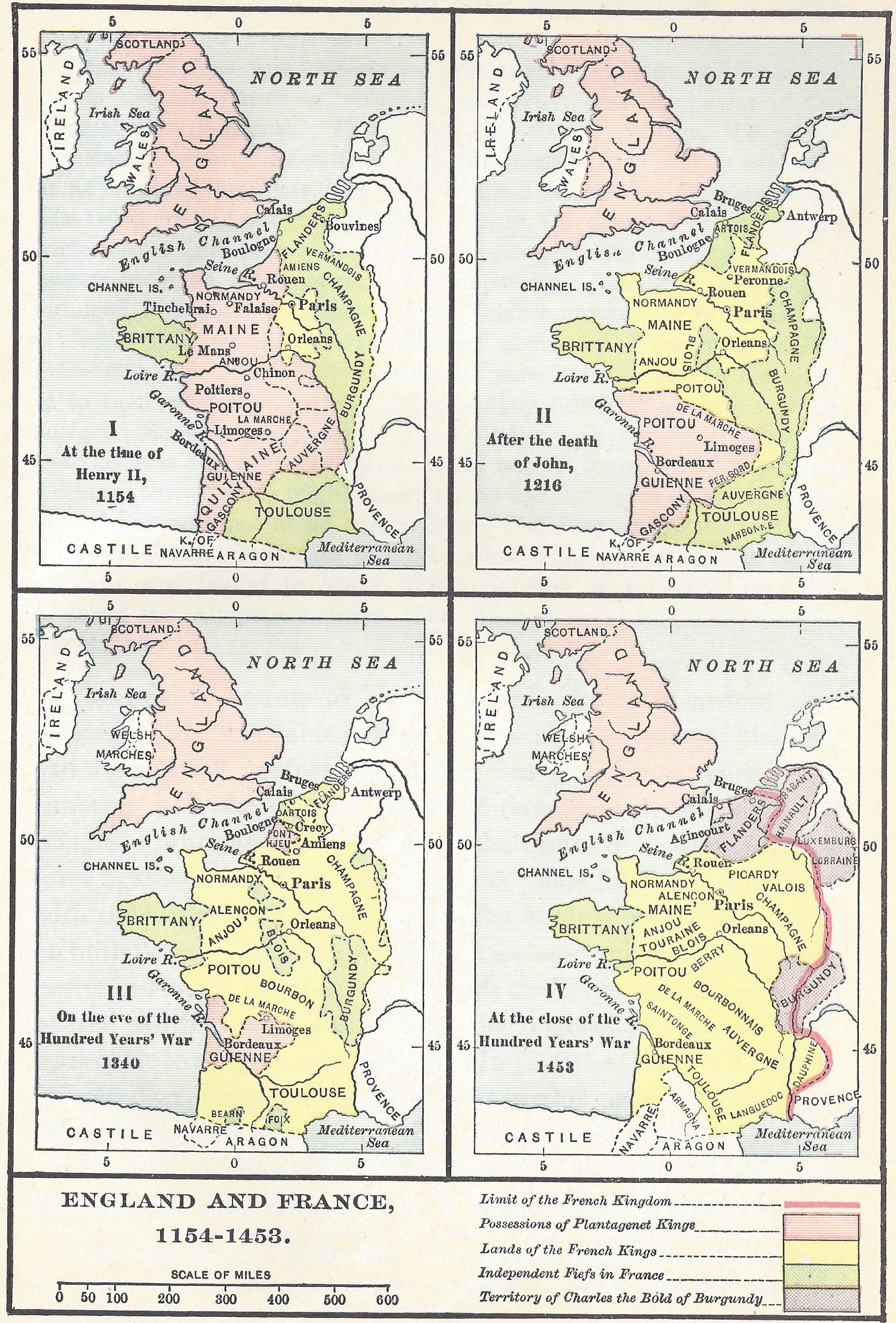
The following is an excerpt (pages 417-424) from Ancient and Medieval History (1944) by Francis S. Betten, S.J. Although some information may be outdated, the Catholic historical perspective it provides remains pertinent. Use the link at the bottom of post to read the previous/following pages. Use the Search box above to find specific topics or browse using the Resources tab above.
CHAPTER XXXVII
FRANCE TO THE END OF THE CRUSADES
We now turn to the countries which once made up the Empire of Charlemagne. The western part of the continent with its Roman and Carolingian traditions was the scene of those events, both secular and ecclesiastical, which most affected the history of the world for the next centuries. But it was no longer united. We shall take up first the kingdom of West-Frankland. (Review §§ 445-448.)
THE CAPETIAN KINGS AND THEIR AIM
538. Accession of the Capetians. — During the inroads of the Northmen (before the foundation of Normandy; see § 451, 3), Robert the Strong had defended the city of Paris, then a small town on a marshy island in the Seine River. His origin was obscure. According to some he was a Saxon by extraction. Robert’s son, Odo, in turn heroically held the city throughout a siege of eleven months, carried on by the same terrible foe. Odo obtained the position of Duke of Francia, a district extending across the rivers Seine and Loire, and including the cities of Paris and Orleans. Francia was the principal section of Clovis’ first conquest (§ 417). Like other parts of Charlemagne’s realm, the western kingdom had broken up into a number of dukedoms and similar vassal states, such as Aquitaine, Burgundy, Toulouse, Brittany, Flanders, Champagne, some of them reviving the names of sections of the old Merowingian kingdom.
In 887 an assembly of the nobles of West-Frankland elected Odo, the Duke of Francia, king. For the next hundred years the crown passed back and forth between Odo’s family and the last of the Carolingians. But in 987, after the death of the Carolingian Louis the Sluggard (§ 448), Odo’s grandnephew, Hugh Capet, was elected. With him begins the line of the Capetians, which replaced the Carolingians. The name of Hugh’s dukedom, Francia, was gradually extended to the whole kingdom (§ 446). This is the origin of the name of France.
It was the custom for a king to name a successor during his own lifetime, and then to have the nomination approved by the nobles. For three hundred years, however, each Capetian king was blessed with a son old enough to be capable of receiving the scepter directly from his hands, and, indeed, to be associated with him in the government during his lifetime. So, in the absence of conflicting claims, even the form of election vanished. French kingship became strictly hereditary, and the Capetian family ruled France until very recent days, when France ceased to have kings at all.
539. Reference Table: Capetian Kings to 1314, with Accession Dates
Hugh Capet – 987
Robert II – 996
Henry I – 1031
Philip I – 1060
Louis VI – 1108
Louis VII – 1137
Philip II (Augustus) – 1180
Louis VIII – 1223
Louis IX (the Saint) – 1226
Philip III – 1270
Philip IV (the Fair) – 1285-1314
540. A “Feudal Kingship.” — In 987 there was as yet no “Kingdom of France.” Hugh Capet was crowned “King of the Gauls, Bretons, Danes, Normans, Aquitanians, Goths, Spaniards, and Gascons.” This title shows something of the composite nature of “France” at that date.
The election of Hugh did not increase his actual power. It did increase his duties, but his resources rested on his possessions as Duke of Francia. Several of the great vassals ruling over the rest of France were each almost as powerful as the king, and so far as they obeyed him at all, they obeyed him as their feudal suzerain rather than as a national king. He had no hold upon the subvassals (§ 471, 1) nor did he have a national militia. When he needed an army, his forces came (1) from his own immediate feudal followers in his hereditary duchy, and (2) from such of his great vassals as felt inclined to perform their duties of vassalage.

541. The Work of the Capetians. — Hugh Capet found France broken into feudal fragments, with varying laws and tongues. From these unpromising fragments, the Capetian kings in the next three centuries made a new French nation, with a common language, common customs, and a common patriotism.
Two forces helped the Capetians in this great work of national unification. (1) The Church felt the need of a strong king to protect society against the violence of greedy nobles. And in that day when bishops and abbots were themselves mighty feudal lords, the Church could give not only moral support but important material aid. (2) In the eleventh century the lawyer class rose into importance, especially as the advisers and clerical assistants of the nobles and kings (§ 531, end). They were trained in the Roman law with its imperial traditions (§ 412, note), and they built up a theory of absolute kingship which gave the kings moral support in every new claim for authority.
In the main, however, France was made through the shrewd, tireless, persistent policy of a long line of able kings who never lost sight of their goal.
“There is no other modern nation which owes so heavy a debt of gratitude to its ancient line of kings as the French. France, as it exists to-day, and has existed through all modem history, with all its glorious achievements, is their creation and that of no one else.” — G. B. Adams.
THE KINGS WIN BACK IMPORTANT FIEFS
542. “ France ” Wins the Northwest. — The first great advances were achieved by Philip II, 1180-1223, whom admirers styled Philip Augustus, because, like the Roman Augustus, he had “enlarged the boundaries of the state.” His reign covered the last ten years of Henry II of England, all of Richard’s and John’s reigns, and the early years of Henry III. When Philip came to the throne, Henry II was still working vigorously and wisely to strengthen the national unity of England against feudal “decentralization.” But in France Henry was the chief obstacle to national unity, — not because he was king of England, but because, as a great vassal, he held directly six times as much of France as Philip held directly (§§ 515, 516). In France, Henry always upheld the feudal privileges of the vassals against the crown.
It was natural that a French king should strive to stir up enemies against this too powerful vassal. Philip II set Richard on to make war against his father (§ 525); and when Richard had become king, Philip intrigued with his brother John. Finally, when John succeeded to the English crown, and so to the French fiefs, his follies and crimes gave Philip his long-sought opportunity. Philip’s “court” of great vassals (§ 470, 2) summoned John to answer for his abuses; and, on his failure to appear, declared his fiefs forfeited to the crown. Philip II enforced this judgment by arms, so far as concerned Normandy, Maine, Anjou, Touraine, and Poitou. The northwest quarter of “France” was so added to the French crown, and the immediate territory of the French kings was quadrupled. At last, too, “France” reached the sea, with ports both on the Atlantic and the Channel. The King of England, as Duke of Aquitaine, still ranked among the most powerful French vassals, — along with the Duke of Burgundv. the Duke of Flanders, the Duke of Brittany, and the Count of Champagne.
543. “France” Gains the Southwest. — There had been another of the group, the great Count of Toulouse, most formidable of them all. But the time was near when his land also, from a practically independent vassal state, became an immediate possession of the crown of France.
In this case the success of the French kings came through the accident of a religious war. In the twelfth century there had been a period of decline in the Church (§ 571 ff.). This resulted in the rise of various sects of heretics. Without doubt the worst and most dangerous of them were the Albigenses, so called from the city of Albi in southern France.

Their doctrines were indeed most pernicious. They denied the sacraments and the entire ecclesiastical hierarchy, and the power of the state to punish crimes. There were two classes of them, the perfect and the believers. The perfect were forbidden to marry or to eat meat or any animal products, and were obliged to observe rigorous fasts. The believers had only two duties; namely, the firm will of joining the perfect sometime before death, and the performance of certain acts of reverence when meeting one of the perfect. Whatever vices they indulged in would be forgiven upon their entering the ranks of the perfect. This transition was brought about by a ceremony called consolamentum, which they imagined gave them absolute certainty as to their eternal salvation, provided they fulfilled the duties of the perfect. Should they commit a grievous fault, they were irretrievably lost, because the consolamentum could not be repeated. To prevent a relapse their friends might resort to the simple means of killing them. Such cases were not at all rare. Often, too, they would starve themselves to death. It is easy to see to what relaxation of morals such a doctrine was bound to lead. The judgment of Innocent III, who declared the Albigenses worse than Mohammedans (§ 420), is none too severe.
The mighty counts of Toulouse were the most ardent protectors of this detestable heresy. After all the means of kindness had been tried against the Albigenses for thirty years, Pope Innocent III called upon the Christian princes, including the King of France as the sovereign of the Count of Toulouse, to use force against them. A war of twenty years followed, carried on with much perfidy on the part of the heretics and with cruelty on both parts. Antagonism against a closer union with the royal power in France had much to do with the fierce resistance offered by the southerners. But during the reign of St. Louis IX the wars came to a happy termination. In 1229 the Count of Toulouse promised to give up every attempt at further protecting the heretics. Part of his county he ceded at once to the crown of France. And by the marriage of his daughter to a brother of King Louis IX the rest also entered into a more direct connection with
Capetian France. At the opening of his reign Philip II had ruled directly a twelfth of modern France. King Louis IX’s direct sway extended over more than two thirds of it. “France” had won its way to the Mediterranean.
THE KINGS GAIN ABSOLUTE POWER
544. Growth of the Absolute Monarchy. — As the kings acquired the soil of France, piece by piece, their realm outgrew the crude feudal system, and they had to create new machinery of government. And as they added territory to territory, so too they added authority to authority. Here, too, Philip II, Augustus, made a beginning. He divided the royal territory into great districts, and over these he set royal officers, usually of humble origin so that they could not aspire to independent power.

His grandson, St. Louis IX, continued the work of organization. He, like the English kings, struck hard at feudalism, not because he hated the ancient institutions, but because he perceived their shortcomings, and out of a sense of justice endeavored to remedy them. He entirely abolished the right of private feuds (§ 479), and greatly improved criminal justice by doing away with the judicial combat. He opened the king’s supreme court to appeals from all the lower feudal courts. (See § 471, 1.) Thus he gradually concentrated the administration of justice in the crown. Similarly all the other branches of the government were reorganized by him. Philip IV, the Fair, Louis IX’s grandson, was of a different stamp. His unbounded selfishness did not shrink from any acts of the most crying injustice, rapacity, and violence (§ 666). But he, too, contributed his share towards the building up of the system of absolute government in France.
In each district the royal officer was given vast authority as a representative of the king. He appointed inferior officers, collected royal revenues, — including new taxes of a modern sort which Philip IV introduced, — and oversaw every detail of local administration. The feudal lords lost all power in government, except over their serfs and villeins. These classes alone did not gain in the changes in France, except in the greater quiet and freedom from war. But the small vassals and the townsmen found escape from the rapacity and capriciousness of their old feudal lords.
In England this escape had come through the courts, the itinerant justices, and the free principles of the common law, as Englishmen grew to have an instinctive reverence for courts and law as the protectors of liberty. In France the like security came (a little later than in England) through the power intrusted to their officers by the kings.
545. The Estates General. — France, too, had its Great Council like England (§ 511). Philip IV, the Fair, added representatives of the cities to those of the nobility and the clergy. In 1302, only a few years after the Model Parliament in England, these new “Estates General” had their first meeting. But the assembly was never more than a convenient taxing machine. Nor did the French people know how to value and utilize it as the English people did. The kings summoned the Estates General when they chose, and they easily controlled its actions. When they no longer needed it, the meetings grew rarer and at last ceased entirely.
546. St. Louis IX is one of the noblest figures in medieval history. He possessed the piety of a child. Though a brave and brilliant knight and intrepid warrior, he was an ardent lover of peace, and never drew his sword except in a good cause and after all other means had been exhausted. We shall meet him again as a crusader (§ 596). His principles as man and as ruler are well expressed in his deathbed testament to his son Philip III, the Bold, of which the following is an extract.
“Fair son, the first thing that I teach thee is to mold thy heart to love God. If God send thee adversity, accept it patiently. If he send thee prosperity, thank him humbly, that thou be not worse through pride. Bear thyself so that thy confessor and friends may venture to reprove thee for thy misdeeds. Attend devoutly to the service of Holy Church both with mouth and mind. Let thy heart be gentle and compassionate toward the poor and the afflicted, and comfort them so far as in thee lies. Help the right, and uphold the poor man until the truth be made manifest [i.e. while the case is undecided]. Be careful to have good provosts and bailiffs, and make frequent inquiries about them, and about all thy servants as to how they conduct themselves. Dear son, I bestow upon thee all the benediction a good father can give a good son. And may the blessed Trinity preserve and defend thee from all evil, and give thee grace to do the will of God.”